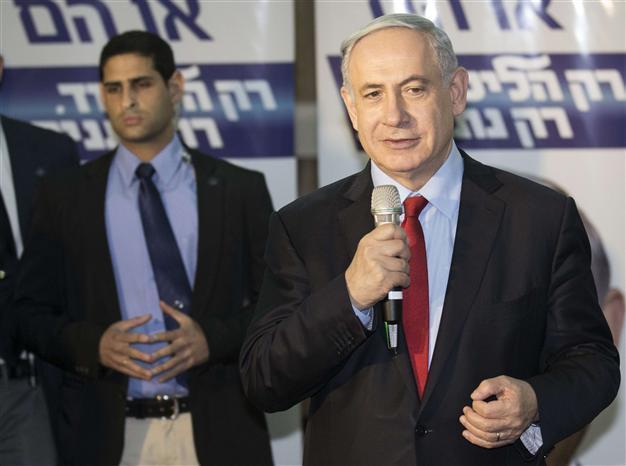Netanyahu lags centre-left in last polls before Israel vote
JERUSALEM - Agence France-Presse

A picture taken on March 11, 2015 shows Israeli Prime Minister and Likud party's candidate running for general elections, Benjamin Netanyahu, giving a speech to his supporters during an election campaign meeting in the Israeli Mediterranean coastal city of Netanya. AFP Photo.
Final opinion polls published Friday put Israeli Prime Minister Benjamin Netanyahu's rightwing Likud party four seats behind its centre-left rival with four days to go before a general election.Several polls released on Friday -- the last day opinion surveys can be released before Tuesday's vote -- showed the Zionist Union pulling further ahead of Likud after an intense campaign.
Netanyahu, who gambled by calling the vote nearly two years early after his government coalition fell apart late last year, has warned Israel's security will be at risk if his rivals win.
But the opposition's call for change after nearly six years of rule by the divisive Netanyahu appears to have been heard by many voters.
A poll in the top-selling Yediot Aharonot newspaper showed the Zionist Union winning 26 of the 120 seats in the Israeli parliament, or Knesset, against 22 for Likud.
Other polls for the Jerusalem Post and Maariv dailies, and for Israeli public radio, also showed a four-seat gap, with the Zionist Union taking 25 seats to 21 for Likud.
All the polls showed the Joint List, a newly formed alliance of Israel's main Arab parties, in third, with 13 seats.
he centrist Yesh Atid of former finance minister Yair Lapid and the far-right Jewish Home were both expected to win at least 11 seats, the polls showed.
The Zionist Union was created in December by fusing Israel's once-dominant Labour party with the centrist HaTnuah led by Tzipi Livni, Israel's former chief peace negotiator with the Palestinians.
Should they form the next government, the parties have agreed on a two-year rotation for the premiership, with Herzog taking the first tenure.
Under Israel's proportional vote system, instead of electing individual members of the Knesset voters choose party lists, with seats distributed according to the percentage of the vote received.
Even if it does win the most seats, the Zionist Union will not necessarily be tasked with forming the next government.
With polls showing Netanyahu's natural allies on the right likely to win the most seats overall, he has a clear advantage in piecing together a coalition and may instead be tasked by President Reuven Rivlin with forming a government.
Still, a clearly frazzled Netanyahu has stepped up his rhetoric ahead of the vote, urging supporters to prevent a victory for his rivals.
"If we don't close the gap within the next few days, there is definitely a danger that Herzog and Livni will be Israel's next prime ministers," Netanyahu told Channel Two television late Thursday.
Yediot Aharonot analyst Sima Kadmon said a lot could still change before polling stations open on Tuesday.
"As has been proven in previous elections, four days is a long time," she wrote on Friday, pointing out that over the same period in the run-up to the January 2013 election Yesh Atid gained four to five seats over what polls had forecast.
"The way down is even quicker," she added. "A party with a negative momentum could find itself on Tuesday night with fewer seats than the last poll predicted."
Naftali Bennett, head of the ultra-nationalist Jewish Home, called for a united pre-election rally of the right to be held in Tel Aviv.
"On Sunday at 7:00 pm there will be a big rally of the national camp," he said in a video posted on his Facebook site.
"I expect everyone to come, thousands and thousands will be there," he said.
A Likud spokesman said the event was not being organised by Netanyahu's party but it was likely that Likud supporters would attend.
















